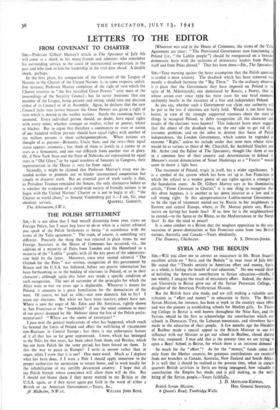LETTERS TO
THE EDITOR
FROM COVENANT TO CHARTER Ste,—Professor Gilbert Murray's article in The Spectator of July 6th will come as a shock to his many friends and admirers who remember his outstanding service to the cause of international co-operation in the past and who look to him for leadership in the vital days ahead. A double shock, perhaps.
In the first place, his comparison of the Covenant of the League of Nations to the Charter of the United Nations is, in some respects, unfair. For instance, Professor Murray complains of the right of veto which the Charter reserves to " the five so-called Great Powers " over most of the proceedings of the Security Council ; but he never mentions that any member of the League, being present and voting, could veto any decision either of its Council or of its Assembly. Again, he declares that the new . Council lacks true justice because the Great Powers are given a right of veto which is denied to the weaker nations. Surely the reasoning here is unsound. Every individual person should, no doubt, have equal rights with ,every other, whether stronger or weaker, richer or poorer, whiter or blacker. But to argue that therefore a community or state or nation of one hundred million persons should have equal rights with another of ten million persons is sheer authropomorphism. When nations are thought of as persons—Britannia, Uncle Sam,. and the rest—their equal status appears axiomatic ; but think of them as jewels in a crown or as stars in a firmament, and one star differeth from another star in glory. Or, if New York State and the State of Nebraska are represented by equal stars in " Old Glory," or by equal numbers of Senators in Congress, their representation in the House is very far from equal. Secondly, it might be claimed that Professor Murray's essay was in- tended neither to promote nor to hinder international cooperation but simply to discover truth. But an essential part of truth surely is that, as President Truman reminded the Senate, the only alternative before us is whether the evolution of a world-wide society of friendly nations is to begin with the United Nations' Charter or is not to begin at all: " the Charter or world chaos," as Senator Vandenberg put it.—I am, Sir, your The Athenaeum, S.W.i.


























 Previous page
Previous page